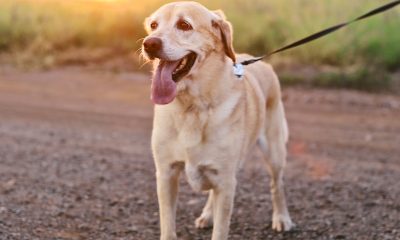Health Issues
Recognizing and Treating Respiratory Problems in Dogs

If your furry friend is experiencing difficulty breathing or coughing, it’s important to recognize and treat respiratory problems in dogs.
In this article, we’ll guide you through common signs to watch out for and diagnostic testing options available.
You’ll also gain understanding about asthma, bronchitis, and pneumonia in dogs, along with effective treatment options for these conditions.
By being proactive and informed, you can ensure your dog’s respiratory health is well taken care of.
Common Signs of Respiratory Problems in Dogs
You should be aware of the five common signs of respiratory problems in dogs. Recognizing these signs early can help you provide prompt treatment and ensure the well-being of your furry friend.
One of the most obvious signs of respiratory distress in dogs is difficulty breathing. If you notice your dog panting excessively or struggling to catch their breath, it could indicate a respiratory problem.
Another sign to watch out for is persistent coughing. If your dog has been coughing for more than a few days, it may be a sign of an underlying respiratory issue.
Additionally, nasal discharge is another common sign. If you notice your dog’s nose constantly running or if the discharge is thick and colored, it could be a sign of respiratory infection.
Other signs include sneezing and wheezing. If your dog is sneezing frequently or making a wheezing sound while breathing, it’s important to have them checked by a veterinarian.
Diagnostic Testing for Respiratory Conditions in Dogs
There are several diagnostic tests available to accurately diagnose respiratory conditions in dogs. If your furry friend is showing signs of a respiratory infection, it’s essential to seek proper diagnosis and treatment. Respiratory disease testing can help identify the underlying cause of your dog’s symptoms and guide the veterinarian in developing an effective treatment plan.
One common diagnostic test for respiratory infections is a bacterial culture. This test involves collecting a sample from the affected area, such as the nose or throat, and sending it to a laboratory for analysis. The lab technicians will identify the specific bacteria causing the infection, allowing the veterinarian to prescribe the appropriate antibiotics.
Another diagnostic tool is a chest X-ray. This imaging test can reveal abnormalities in the lungs, such as fluid buildup or tumors. It can help the veterinarian determine the severity of the respiratory condition and plan further treatment options.
In some cases, a bronchoscopy may be necessary. This procedure involves inserting a thin, flexible tube into the airways to visualize any abnormalities. It allows the veterinarian to directly examine the respiratory system and collect samples for further analysis.
Understanding Asthma in Dogs: Causes and Treatment
Do you know what causes asthma in dogs and how to treat it?
Asthma in dogs can be triggered by various factors such as allergens, smoke, and stress.
Managing canine asthma involves identifying and avoiding triggers, providing appropriate medications, and creating a stress-free environment for your furry friend.
Let’s delve into the causes and treatment of asthma in dogs.
Asthma Triggers in Dogs
If your dog has asthma, it is important to identify and avoid potential triggers that can worsen their symptoms. Allergens such as pollen, dust mites, and mold can be common triggers for dogs with asthma. Additionally, respiratory infections can also aggravate their condition. By understanding and managing these triggers, you can help alleviate your dog’s discomfort and improve their quality of life.
To help you identify potential triggers for your dog’s asthma, here is a table highlighting common allergens and respiratory infections that can affect them:
| Allergens | Respiratory Infections |
|---|---|
| Pollen | Kennel Cough |
| Dust Mites | Canine Influenza |
| Mold | Bordetella |
| Pet Dander | Pneumonia |
| Smoke | Bronchitis |
Managing Canine Asthma
To effectively manage your dog’s asthma, it’s crucial to understand the causes and treatment options for canine asthma. Canine asthma is a condition that affects the respiratory system of dogs, causing breathing difficulties and other respiratory problems.
It’s important to take proactive measures in preventing respiratory problems in dogs, especially if your furry friend has asthma. Regular veterinary check-ups and monitoring of your dog’s symptoms are essential for proper management.
Your veterinarian may prescribe medications such as bronchodilators or corticosteroids to help control the inflammation and open up the airways. Additionally, avoiding triggers such as smoke, dust, or strong fragrances can help prevent asthma attacks.
Maintaining a clean and allergen-free environment for your dog is also crucial. Remember, by understanding and managing your dog’s asthma, you can ensure their well-being and provide them with a better quality of life.
Bronchitis in Dogs: Symptoms and Management
You should be aware of the symptoms and management of bronchitis in dogs. Bronchitis is a common respiratory condition that can affect dogs of all ages and breeds. It is important to recognize the signs of bronchitis early and take appropriate measures to manage the condition.
Symptoms of Bronchitis in Dogs
| Respiratory Symptoms | Other Symptoms |
|---|---|
| Chronic cough | Fatigue |
| Difficulty breathing | Loss of appetite |
| Wheezing | Weight loss |
If your dog is experiencing any of these symptoms, it is crucial to seek veterinary attention. The veterinarian will perform a thorough examination and may recommend diagnostic tests, such as x-rays or blood work, to confirm the diagnosis.
Management of Bronchitis in Dogs
| Treatment Options | Management Strategies |
|---|---|
| Medications | Environmental changes |
| Antibiotics | Avoidance of triggers |
| Bronchodilators | Regular exercise |
The treatment for bronchitis will depend on the severity of the condition and the individual dog’s needs. Medications, such as antibiotics and bronchodilators, may be prescribed to alleviate symptoms and reduce inflammation. Environmental changes, such as avoiding smoke or allergens, can also help manage bronchitis in dogs.
Pneumonia in Dogs: Recognizing and Treating the Infection
The article discusses the importance of recognizing and treating pneumonia in dogs. As a responsible dog owner, it’s crucial for you to be aware of the signs and symptoms of this respiratory infection.
Pneumonia in dogs can be caused by various factors, such as bacteria, viruses, or even inhaling foreign objects. Prevention is key in avoiding this condition, and regular visits to the veterinarian can help identify any potential respiratory infections in your furry friend.
If your dog shows symptoms such as coughing, difficulty breathing, lethargy, or a loss of appetite, it’s important to seek immediate veterinary care. Prompt treatment can prevent the infection from worsening and potentially causing severe complications. Your veterinarian will conduct a thorough examination, which may include chest X-rays and blood tests, to diagnose pneumonia in your dog.
Treatment for pneumonia usually involves a combination of antibiotics, supportive care, and sometimes hospitalization. It’s essential to follow your veterinarian’s instructions regarding medication dosage and administration. Additionally, providing a comfortable and stress-free environment for your dog can aid in their recovery.
Effective Treatment Options for Respiratory Problems in Dogs
If your dog is experiencing respiratory problems, there are several effective treatment options available, such as medication and therapy. These options aim to provide your furry friend with the necessary respiratory support to improve their quality of life. In addition to traditional medical approaches, alternative therapies can also be considered to complement the treatment plan.
Medication is a common treatment option for respiratory problems in dogs. Your veterinarian may prescribe antibiotics to treat bacterial infections or bronchodilators to help open up the airways. These medications can help reduce inflammation and improve breathing. It’s important to follow the prescribed dosage and administration instructions to ensure the best results.
Therapy can also play a significant role in respiratory support for dogs. Physical therapy, such as chest physiotherapy or respiratory exercises, can help strengthen the respiratory muscles and improve lung function. In some cases, oxygen therapy may be necessary to provide additional respiratory support.
Alternative therapies, such as acupuncture or herbal remedies, can also be considered as part of the treatment plan. These therapies focus on promoting overall well-being and may help alleviate respiratory symptoms. However, it’s essential to consult with your veterinarian before incorporating any alternative therapies into the treatment plan.
Frequently Asked Questions
Can Respiratory Problems in Dogs Be Contagious to Other Pets or Humans?
Respiratory problems in dogs can be contagious to other pets and humans, posing zoonotic risks. It’s essential to recognize symptoms and seek veterinary care promptly to prevent transmission and protect the health of all.
What Are Some Natural Remedies or Home Treatments for Respiratory Problems in Dogs?
Take a breath of fresh air for your furry friend! Find relief from respiratory problems in dogs with natural remedies and holistic treatments. Rest easy knowing you’re providing the best care possible.
How Long Does It Usually Take for a Dog to Recover From Respiratory Problems?
It usually takes a dog some time to recover from respiratory problems. The recovery duration can vary depending on the severity of the condition and the effectiveness of different treatment methods.
Are Certain Dog Breeds More Prone to Respiratory Problems Than Others?
Certain dog breeds, due to their genetic makeup and physical characteristics, may be more prone to respiratory problems than others. It’s important to be aware of this susceptibility when considering the health of different dog breeds.
Can Respiratory Problems in Dogs Be Prevented Through Vaccinations or Other Preventive Measures?
You can prevent respiratory problems in dogs by ensuring they receive vaccinations and taking other common preventive measures. Vaccinations are important in safeguarding your dog’s respiratory health and reducing the risk of complications.
-

 Health Issues3 years ago
Health Issues3 years agoIdentifying and Treating Parasites in Dogs
-

 Dog Food3 years ago
Dog Food3 years agoIdentifying And Treating Dog Food Allergies
-

 Dog Training3 years ago
Dog Training3 years agoUsing Treats Effectively When Dog Training
-

 Health Issues2 years ago
Health Issues2 years agoCommon Digestive Problems in Dogs and How to Address Them
-

 Dog Training2 years ago
Dog Training2 years agoUnderstanding Fear and Anxiety in Dogs and How to Help Them
-

 Dog Training2 years ago
Dog Training2 years agoThe Role of Punishment in Dog Training: Pros and Cons
-

 Dog Food2 years ago
Dog Food2 years agoWet Vs. Dry Dog Food: Which Is Better
-

 Health Issues2 years ago
Health Issues2 years agoEssential Vitamins and Minerals for Your Dog’s Health






























































